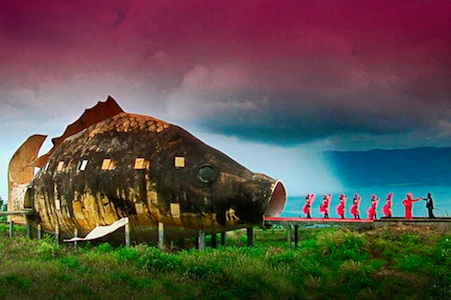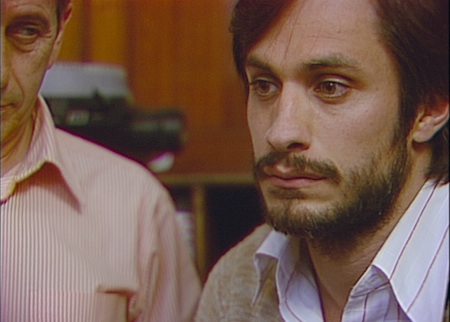
It’s the midpoint of the terse Telluride Film Festival and I’m in “the Zone,” a place that offers the “possibility of cinema as semi-permanent pilgrimage site,” as described by writer and Telluride guest director Geoff Dyer in his book (Zona) about a journey into a film (Andrei Tarkovsky’s Stalker). Indeed, Telluride encourages something of a pilgrimage, typically accessed by car from major regional cities several hundred miles away, by way of denuded deserts that, topographically, may as well be science fiction. Should the allegorical “Room” exist in which one’s deepest wishes are granted, as per Stalker, then it would for me involve sitting in the festival’s Galaxy theater (its most tricked-out venue, which doubles as a gymnasium) watching, say, Something in the Air (Olivier Assayas). But then I’d be in Venice.
But I’m not in Venice; I’m in the Rocky Mountains. And Telluride fulfills a mission that no cinephile could fault. The Palme d’Or-winning Michael Haneke film Amour is here. Apparently no longer in maudit mode, Haneke is succeeded by Ulrich Seidl, whose Paradise: Love (the first installation of a trilogy, the second playing simultaneously in Venice) glosses with sublime—or at least Ed Lachman-lensed—misanthropy. Gael Garcia Bernal is here, albeit smuggled inside an anachronistically clever but deeply caustic Pablo Larrain film. Herzog is here, even if he’s not; represented by two picks (Lessons of Darkness and The Great Ecstasy of Woodcarver Steiner) from Dyer, and conjured by his endorsement of the festival doc, The Act of Killing (Joshua Oppenheimer, brilliantly candid). Indeed just this morning a cast of who’s whos convened in the town center for the annual photo op while singing Werner a happy birthday on video.
As ubiquitous as Herzog’s spirit at Telluride is talk of cinema as “magic.” Theater managers are “ring masters” and speeches are sparked with reference to the alchemical thing that happens when we convene in the dark, together, under the spell of stories gathered the world over but beamed from a light box. Although some of the “magic” was as unexpected as the butterfly that alighted on the screen for the duration of Haneke’s Amour, which seemed to be mocking Trintignant’s etched scowl.
Still, I found myself in The Zone, and in it The Room. More specifically, I was in the town courthouse, which had been repurposed for scheduled guests to debate issues of the medium, and for establishing some artistic justice. Here Geoff Dyer was deferring to Errol Morris who in turn was tempting Dyer, the two entertaining us with a dialogue that got downright philosophical. Instead of magic, there was talk of artistic provenance, of “tracing back the causal chain of the painting, the photograph, the novel,” said Morris, who was keen to stress “the importance of ambiguity in great art.” Whether fact or fiction, true or false, the work of art is at the mercy of the real world: “You need it to accomplish the task,” said the notorious director of The Thin Blue Line, whose jocular nature belied his seriousness, just as Dyer’s erudition could throw one off the scent of his dry hilarity. If the subject of Cinema was conspicuously absent from their dialogue, it was not unlike the Dyer-cited fatescapes by Slovak photographer Pavel Maria Smejkal, in which iconic photos have been excised of their subjects by manipulation, leaving only an emptied space. The effect is a desire to fill in the absence, to reconstruct a subject. Both Dyer and Morris were complicit in a pursuit for an “ecstatic truth” (the specter of Herzog, again), a kind of sublime lie achieved forensically by Morris in his investigative documentaries, and by Dyer through making himself “always available.”
Thus the films at Telluride were obliged to meet this aesthetic standard established by the two disparate artists. Could a given film sustain the level of curiosity Dyer aimed at John Berger channeling the British painter William Turner as a child, immersed in the ambience of his father’s steaming and blood flecked barbershop? Was there not an affecting narrative—the envy of film—about Morris’ own experience of becoming a filmmaker, impelled by his disgust of his own handwriting, then a fear of typing mistakes, ultimately begetting his preferred medium of filming, whereby others “do the writing for you?”
It was tempting to stray over to Dyer’s handpicked selection, Claire Denis’ Beau Travail to anoint the mood. Or, programmed into the price-does-not-reflect quality (free) venue known as The Backlot, a minor but revelatory doc by and about Raymond Depardon, with his longtime recordist Claudine Nougaret, Journal de France only begins to touch upon the living legend that is Depardon, itinerant photojournalist, filmmaker, and now roadside chronicler of the vintage tabac, its elder denizens framed for a portrait 20 years after Depardon snapped their first. Time passes, and it’s hard to believe that it is this Depardon, unpacking his tripod and large format camera like a man on French holiday, who once went lens first into political crises in Chad and Chile for his venerable Gamma agency. Talk about an ongoing moment.
Pablo Larrain’s No employs a brilliant visual and narrative strategy for his continued look at the corrosive legacy of Pinochet’s regime, whose closure was anticipated by rival marketing campaigns aimed to depose (“No”) or reinstate him (“Si”). That the opposition (headed up by a newly appointed ad agent played by Bernal) contrives their message as if war crimes were akin to an off flavor in a soda pop only anticipates our modern political climate of sellable candidates and affinity-based politics. The Hi 8 video (if that’s what’s responsible for this beautifully ugly film), the microwave ovens, effusive dance routines and bad anthems, and overall ’80s cheese are diverting of the historical tragedy that lurks beneath the televised (cruddy reception, of course) revolution, then Larrain’s campaign has certainly succeeded in its warning. Leave it to Sony Picture Classics to come up with a suitable ad campaign for its latest purchase.
Possibly the most debated film at Telluride, while not the most hyped (that would be Ben Affleck’s thriller set to the Iranian revolution, Argo) has been the mind-bending, hyper-reflexive documentary The Act of Killing (Joshua Oppenheimer, Denmark), which inverts if not entirely subverts the media/politic axis, exposing Indonesia’s paramilitary reign of terror by interrogating its chief executioners through an uneasy collaboration: enlisting them to re-enact their crimes for film. Not so much a case of giving his subjects enough rope by which to hang themselves, the film literally sets the stage for his pathetically powerfully thugs, led by the most stylish incarnation of evil in one Anwar Congo, to brandish the very wire by which their victims (Chinese Communists) were commonly murdered, while dress-rehearsing for the camera with bravura gleaned from American gangster movies (the connection is among the film’s manifold devastations). The ineffable horror of atrocity is subsumed by its tackily garish reproduction, only to be coughed up as a doubly horrific simulacrum that takes the place of any real fathomable response to violence. Helplessness is both the subject at moral stake as well as the condition the film perversely achieves. An auto-critique of the observational documentary, the film insinuates itself, per Slavoj Zizek, into an ideological system in order to undermine it with a common vocabulary. “What is the most productive reality you can create with your subjects?” implored the outspoken Oppenheimer, who had taken his Q&A outside, into the rain, and under a canopy to field something of a defense. Even if only an audience of 30 remained, it was among the more efficient post-screening discussions I’ve witnessed; fully rapt, zero indifference.
If great works of art require ambiguity, they may thus definitively enlist the conscience. Haneke’s moral lessons spook for the way they elicit Oppenheimer’s comment that we are “too often closer to the perpetrators than the victims than we care to admit.” Since Amour, I hadn’t seen so stark an act of euthanasia since Betty Bleu was snuffed out in order to cure the perpetrator of his writer’s block. I don’t much care to know if Haneke’s title is ironic, but I can’t erase from memory the image of Trintignant’s character trapping a pigeon within a blanket and showing some mercy with it. “You can’t force me to let you die,” he tells his ailing wife when she refuses to be nourished. Conversely, you can’t be forced to help someone in need, and therein lies the horror of The Act of Killing and the ever-discreet reveal, however mine, of Haneke’s carefully constructed conceit.
“The altitude makes you teary,” whimpered an elated Greta Gerwig upon reception of Noah Baumbach’s Frances Ha, which owes considerably to her screenwriting talents as well as the fumbling grace of her performance. So faithful to the inadmissible anxieties of a distracted generation for whom sincerity is for suckers, for whom narcissism is a factor of too many mirrors in the bedroom, Frances Ha is so steeped in the intrinsic logic of its characters’ irony that it’s difficult to see that this pop record of a film is richly composed (and yeah, that’s Delerue on the soundtrack) by Baumbach. There’s a good possibility that Gerwig’s Frances is too young to know Carax’s Mauvais Sang, though she’s participant to a city dash inspired by the film’s David Bowie-scored tracking shot. It’s an ecstatic moment that, because of and not in spite of its levity, might be described as magical. But that would take me out of the Zone.




